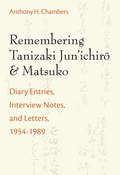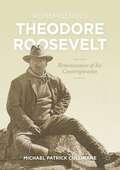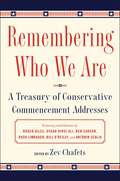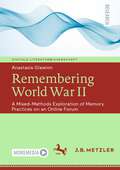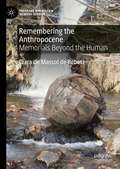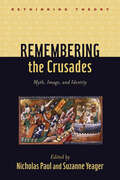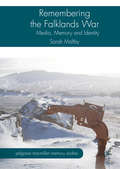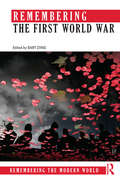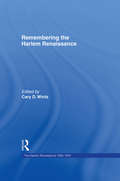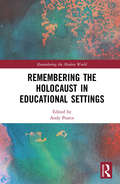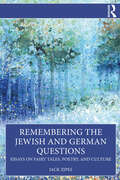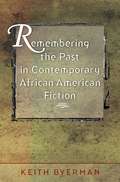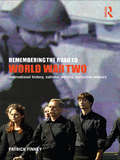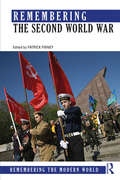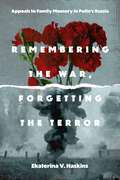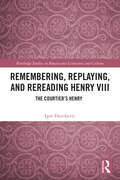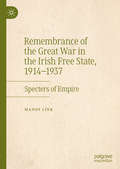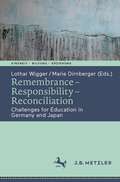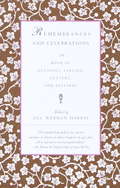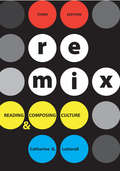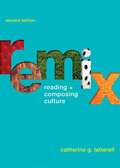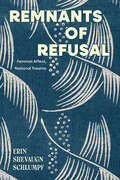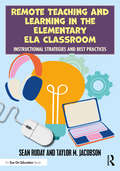- Table View
- List View
Remembering Tanizaki Jun’ichiro and Matsuko: Diary Entries, Interview Notes, and Letters, 1954-1989
by Anthony Hood ChambersRemembering Tanizaki Jun’ichiro and Matsuko provides previously unpublished memories, anecdotes, and insights into the lives, opinions, personalities, and writings of the great novelist Tanizaki Jun’ichiro (1886–1965) and his wife Matsuko (1903–1991), gleaned from the diaries of Edward Seidensticker and two decades of Anthony Chambers’s conversations with Mrs. Tanizaki and others who were close to the Tanizaki family.
Remembering Theodore Roosevelt: Reminiscences of his Contemporaries (The World of the Roosevelts)
by Michael Patrick CullinaneThis book sheds new light on the life and times of Theodore Roosevelt, drawing on a remarkable set of oral histories gathered in the 1950s from those who knew him. Remembering Theodore Roosevelt presents fourteen intimate interviews with Roosevelt’s friends, family, and contemporaries. Never before published, the transcripts reveal colorful details about the infamous Rough Riders, the political scene in New York City, the lives of his extended family, including the Hyde Park Roosevelts Franklin and Eleanor, and how the former president inspired successive generations. The book benefits from the author’s discerning annotations and commentary that provide the reader with lesser-known facts and a full appreciation of the oral history project.
Remembering Who We Are
by Zev ChafetsThe perfect gift for graduates - thirty commencement addresses about liberty, patriotism, tradition, and other conservative themes that are rarely heard on campus.The college graduation speech has become another casualty of our age of political correctness. Historically, universities are supposed to be strongholds of tolerance, where any idea can be discussed--and tested rigorously to see if it has merit. Students should benefit from free expression and diversity of opinions, about current events and eternal questions alike.But today, certain positions are considered too controversial for the fragile ears of liberal students, and for administrators who usually surrender to their demands. It's no longer unusual when a U.S. Senator like Ted Cruz, a pioneering neurosurgeon like Ben Carson, a Supreme Court Justice like Antonin Scalia, or a human rights advocate like Ayaan Hirsi Ali faces protests, disrespectful shouting, or petitions to have his or her invitation revoked.Fortunately, Remembering Who We Are collects the commencement wisdom of a wide range of thinkers who are willing to challenge the liberal consensus on campus. Editor Zev Chafets has brought together a diverse group of speakers from many walks of life, from playwright David Mamet to Ambassador Ryan Crocker, from Governor Bobby Jindal to humorist PJ O'Rourke. For example, you'll find in these pages: * "Do Your Best to Be Your Best" by Supreme Court Justice Clarence Thomas * "Gridlock, An American Achievement" by columnist George F. Will * "We Have Something Wonderful" by novelist Marilynne Robinson * "The Art of the Entrepreneur" by business leader Mort Zuckerman * "Restore and Remake Our Country" by historian Victor Davis HansonToo many students now enter the real world after being taught that patriotism is misguided, that religious faith is for the foolish, and that free enterprise is unfair. The eloquent speeches in this collection will help them grasp the truth - that America is flawed but fundamentally good; that faith can have intellectual depth; that capitalism is the world's greatest force for fighting poverty; and much more.From the Hardcover edition.
Remembering World War II: A Mixed-Methods Exploration of Memory Practices on an Online Forum (Digitale Literaturwissenschaft)
by Anastasia GlawionThe book demonstrates an evidence-based approach to online memory practices of World War II. Network analysis is applied to reduce a massive and unreadable dataset of forum texts and user relations. Further, the results are combined with other text analysis methods, such as topic modeling and contrastive stylometric analyses. A sample of discussions from each group is read and categorized. Based on the results, the forum users‘ memory practices are labelled as empirical, conversational and conservational practices, whereby recent theoretical developments in Memory Studies are considered.
Remembering the Anthropocene: Memorials Beyond the Human (Palgrave Macmillan Memory Studies)
by Clara de Massol de RebetzThis book provides a definition of the developing field of environmental memory studies. It reflects on the possibilities, challenges, prospects and limitations of culturally and collectively remembering (in) the Anthropocene. Located at the intersection of environmental humanities and memory studies, the analysis draws on and surveys a series of Anthropocene-related memorials, from a sculpture lost in Welsh waterways to cat colonies and perennial chickens. This leads to an examination of different memory agents across histories – past, present and future – and an investigation of memorialisation politics under new ecological regimes, within and beyond the human.
Remembering the Crusades: Myth, Image, and Identity (Rethinking Theory)
by Nicholas Paul and Suzanne YeagerFew events in European history generated more historical, artistic, and literary responses than the conquest of Jerusalem by the armies of the First Crusade in 1099. This epic military and religious expedition, and the many that followed it, became part of the collective memory of communities in Europe, Byzantium, North Africa, and the Near East. Remembering the Crusades examines the ways in which those memories were negotiated, transmitted, and transformed from the Middle Ages through the modern period. Bringing together leading scholars in art history, literature, and medieval European and Near Eastern history, this volume addresses a number of important questions. How did medieval communities respond to the intellectual, cultural, and existential challenges posed by the unique fusion of piety and violence of the First Crusade? How did the crusades alter the form and meaning of monuments and landscapes throughout Europe and the Near East? What role did the crusades play in shaping the collective identity of cities, institutions, and religious sects? In exploring these and other questions, the contributors analyze how the events of the First Crusade resonated in a wide range of cultural artifacts, including literary texts, art and architecture, and liturgical ceremonies. They discuss how Christians, Jews, and Muslims recalled and interpreted the events of the crusades and what far-reaching implications that remembering had on their communities throughout the centuries. Remembering the Crusades is the first collection of essays to investigate the commemoration of the crusades in eastern and western cultures. Its unprecedented multidisciplinary and cross-cultural approach points the way to a complete reevaluation of the place of the crusades in medieval and modern societies.
Remembering the Falklands War
by Sarah MaltbyThis book offers an empirically informed understanding of how identity and agency become wholly embedded within practices of media-remembering. It draws upon data collected from the British military, the BBC and Falkland Islanders during the 30th Anniversary of the Falklands war to uniquely offer multiple perspectives on a single 'remembering' phenomenon. The study offers an analysis of the convergence, interconnectedness and interdependence of media and remembering, specifically the production, interpretation and negotiation of remembering in the media ecology. In so doing it not only examines the role of media in the formation and sustaining of collective memory but also the ways those who remember or are remembered in media texts become implicated in these processes.
Remembering the First World War (Remembering the Modern World)
by Bart ZiinoRemembering the First World War brings together a group of international scholars to understand how and why the past quarter of a century has witnessed such an extraordinary increase in global popular and academic interest in the First World War, both as an event and in the ways it is remembered. The book discusses this phenomenon across three key areas. The first section looks at family history, genealogy and the First World War, seeking to understand the power of family history in shaping and reshaping remembrance of the War at the smallest levels, as well as popular media and the continuing role of the state and its agencies. The second part discusses practices of remembering and the more public forms of representation and negotiation through film, literature, museums, monuments and heritage sites, focusing on agency in representing and remembering war. The third section covers the return of the War and the increasing determination among individuals to acknowledge and participate in public rituals of remembrance with their own contemporary politics. What, for instance, does it mean to wear a poppy on armistice/remembrance day? How do symbols like this operate today? These chapters will investigate these aspects through a series of case studies. Placing remembrance of the First World War in its longer historical and broader transnational context and including illustrations and an afterword by Professor David Reynolds, this is the ideal book for all those interested in the history of the Great War and its aftermath.
Remembering the Harlem Renaissance (The Harlem Renaissance 1920-1940 #5)
by Cary D. WintzFirst Published in 1996. Routledge is an imprint of Taylor & Francis, an informa company.
Remembering the Holocaust in Educational Settings (Remembering the Modern World)
by Andy PearceRemembering the Holocaust in Educational Settings brings together a group of international experts to investigate the relationship between Holocaust remembrance and different types of educational activity through consideration of how education has become charged with preserving and perpetuating Holocaust memory and an examination of the challenges and opportunities this presents. The book is divided into two key parts. The first part considers the issues of and approaches to the remembrance of the Holocaust within an educational setting, with essays covering topics such as historical culture, genocide education, familial narratives, the survivor generation, and memory spaces in the United States, United Kingdom, and Germany. In the second part, contributors explore a wide range of case studies within which education and Holocaust remembrance interact, including young people’s understanding of the Holocaust in Germany, Polish identity narratives, Shoah remembrance and education in Israel, the Holocaust and Genocide Centre of Education and Memory in South Africa, and teaching at Deakin University, Melbourne, Australia. An international and interdisciplinary exploration of how and why the Holocaust is remembered through educational activity, Remembering the Holocaust in Educational Settings is the ideal book for all students, scholars, and researchers of the history and memory of the Holocaust as well as those studying and working within Holocaust education.
Remembering the Jewish and German Questions: Essays on Fairy Tales, Poetry, and Culture
by Jack ZipesRemembering the Jewish and German Questions: Essays on Fairy Tales, Poetry, and Culture is a selection of Jack Zipes’s insightful essays and presentations on fairy tales, Jewish studies, philosophy, drama, and the German public sphere.The collection begins by considering how fairy tales have been shaped by societies, and how they have influenced society in turn. Zipes considers the history of the Grimms’ fairy tales and their popularity and spread – comparing them to an epidemic. The second chapter champions the work and significance of the great philosopher Ernst Bloch, with substantial engagement with the essay collection Not Yet: Reconsidering Ernst Bloch (Daniel and Moylan 1997). Chapter 3 probes into the way society makes sense of the world through fairy tales and fantasy. In Chapter 4, Zipes explores the shift and reemergence of Jewish culture in Germany in the 1990s. He turns to the work of Gilles Deleuze and Félix Guattari to offer insight into the usefulness of a "minor literature" for grasping the impact of Jewish culture as a minor culture in Germany. The next chapter provides a fascinating case study of Hungarian writer and theater director George Tabori’s relationship to the Jewish Question through examination of his plays from 1968 to 1996. Chapter 6 looks to the fall of the Berlin Wall and the unification of Germany in 1990, and questions around Jewish and German relationships in the public sphere. The final chapter offers detailed examination of Theodor Adorno’s essay “Cultural Criticism and Society” (1951) and remembers forgotten poets who wrote remarkable poems in defiance of the barbarism of World War 2.This interdisciplinary, transnational, and crosscultural collection gathers essays and presentations from Jack Zipes’s captivating oeuvre published or presented across two decades. It provides a celebration of the work of this esteemed and field-defining literary scholar. It is an illuminating book intended for readers interested in fairy tale studies, poetry, drama, and Jewish studies.
Remembering the Past in Contemporary African American Fiction
by Keith ByermanWith close readings of more than twenty novels by writers including Ernest Gaines, Toni Morrison, Charles Johnson, Gloria Naylor, and John Edgar Wideman, Keith Byerman examines the trend among African American novelists of the late twentieth century to write about black history rather than about their own present. Employing cultural criticism and trauma theory, Byerman frames these works as survivor narratives that rewrite the grand American narrative of individual achievement and the march of democracy. The choice to write historical narratives, he says, must be understood historically. These writers earned widespread recognition for their writing in the 1980s, a period of African American commercial success, as well as the economic decline of the black working class and an increase in black-on-black crime. Byerman contends that a shared experience of suffering joins African American individuals in a group identity, and writing about the past serves as an act of resistance against essentialist ideas of black experience shaping the cultural discourse of the present. Byerman demonstrates that these novels disrupt the temptation in American society to engage history only to limit its significance or to crown successful individuals while forgetting the victims.
Remembering the Road to World War Two: International History, National Identity, Collective Memory
by Patrick Finney‘This is comparative history on a grand scale, skilfully analysing complex national debates and drawing major conclusions without ever losing the necessary nuances of interpretation.’ Stefan Berger, University of Manchester, UK Remembering the Road to World War Two is a broad and comparative international survey of the historiography of the origins of the Second World War. It explores how, in the case of each of the major combatant countries, historical writing on the origins of the Second World War has been inextricably entwined with debates over national identity and collective memory. Spanning seven case studies – the Soviet Union, Germany, Italy, France, Great Britain, the United States and Japan – Patrick Finney proposes a fresh approach to the politics of historiography. This provocative volume discusses the political, cultural, disciplinary and archival factors which have contributed to the evolving construction of historical interpretations. It analyses the complex and multi-faceted relationships between texts about the origins of the war, the negotiation of conceptions of national identity and unfolding processes of war remembrance. Offering an innovative perspective on international history and enriching the literature on collective memory, this book will prove fascinating reading for all students of the Second World War.
Remembering the Second World War
by Patrick FinneyRemembering the Second World War brings together an international and interdisciplinary cast of leading scholars to explore the remembrance of this conflict on a global scale. Conceptually, it is premised on the need to challenge nation-centric approaches in memory studies, drawing strength from recent transcultural, affective and multidirectional turns. Divided into four thematic parts, this book largely focuses on the post-Cold War period, which has seen a notable upsurge in commemorative activity relating to the Second World War and significant qualitative changes in its character. The first part explores the enduring utility and the limitations of the national frame in France, Germany and China. The second explores transnational transactions in remembrance, looking at memories of the British Empire at war, contested memories in East-Central Europe and the transnational campaign on behalf of Japan’s former ‘comfort women’. A third section considers local and sectional memories of the war and the fourth analyses innovative practices of memory, including re-enactment, video gaming and Holocaust tourism. Offering insightful contributions on intriguing topics and illuminating the current state of the art in this growing field, this book will be essential reading for all students and scholars of the history and memory of the Second World War.
Remembering the War, Forgetting the Terror: Appeals to Family Memory in Putin's Russia (Rhetoric and Democratic Deliberation)
by Ekaterina V. HaskinsRussian state propaganda has framed the invasion of Ukraine as a liberation mission by invoking the Soviet-era myth of the Great Patriotic War (1941–45), in which the Soviet people, led by Russia, saved the world from the greatest evil of the twentieth century. At the same time, the Russian government has banned civil society institutions and initiatives that remind the country of the legacy of Soviet political violence.Remembering the War, Forgetting the Terror explores the appeal of the cult of the Great Patriotic War and the waning public interest in Soviet political terror as intertwined trends. Ekaterina V. Haskins argues that these developments are driven not only by the weaponization of the official memory of World War II but also by familial pieties and deep-seated habits of memory. Haskins uncovers how widely shared practices of remembrance have taken root and flourished through recurring exposure to war films, urban environments, popular commemorative rituals, and digital archives. Combining scholarship and personal biography, Haskins illuminates why, despite the staggering toll of World War II and internal political violence on Soviet families, most Russian citizens continue to proudly embrace their family’s participation in the war effort and avoid discussion of domestic political persecution. Elegantly written and convincingly argued, this book is an important intervention into contemporary rhetoric and memory studies that will also appeal to broader audiences interested in Russia, Eastern Europe, and the war in Ukraine.
Remembering, Replaying, and Rereading Henry VIII: The Courtier’s Henry (Routledge Studies in Renaissance Literature and Culture)
by Igor DjordjevicThis book begins by asking about the memorial issues involved in the replaying of an old history play, Shakespeare and Fletcher’s Henry VIII, at the Globe on 29 July 1628, but it is not primarily concerned with the memory of a single individual, George Villiers, 1st Duke of Buckingham who paid for the production, nor even of a single day, when he seemed to try to evoke the memories of a small group of people gathered at the theatre for a singular purpose. In order to resolve the mystery of what a group of people thought about the past in a single moment in time, this book studies Elizabethan, Jacobean, and Caroline textual recollections that inform the moment in 1628. Tracing the ways in which Henry VIII was remembered across these years reveals a dominant approach to reading history in the early modern period, and the varied purposes of memorial activity itself.
Remembrance of the Great War in the Irish Free State, 1914–1937: Specters of Empire
by Mandy LinkThis book focuses on how Irish remembrance of the First World War impacted the emerging Irish identity in the postcolonial Irish Free State. While all combatants of the “war to end all wars” commemorated the war, Irish memorial efforts were fraught with debate over Irish identity and politics that frequently resulted in violence against commemorators and World War I veterans. The book examines the Flanders poppy, the Victory and Armistice Day parades, the National War Memorial, church memorials, and private remembrances. Highlighting the links between war, memory, empire and decolonization, it ultimately argues that the Great War, its commemorations, and veterans retained political potency between 1914 and 1937 and were a powerful part of early Free State life.
Remembrance – Responsibility – Reconciliation: Challenges for Education in Germany and Japan (Kindheit – Bildung – Erziehung. Philosophische Perspektiven)
by Lothar Wigger Marie DirnbergerGermany and Japan have taken different ways of dealing with the past of the traumatic events of World War II and their own role. Even after 75 years, the battles for remembrance are not over in both countries. Questions about responsibility, about the educational consequences of history and about possibilities for reconciliation with former enemies are constantly being asked anew and require new answers. The contributions in the book address these questions from a Japanese and German perspective on the basis of empirical and historical research, combining historical, educational, and philosophical approaches and opening up new perspectives for academic research as well as for practical educational work by comparing the cultures of remembrance.
Remembrances and Celebrations: A Book of Eulogies, Elegies, Letters, and Epitaphs
by Jill Werman HarrisThis is a collection of powerful and inspirational responses to loss and to the age-old impulse to honor and memorialize the uniqueness of each human being. For the bereaved, the ritual of delivering a eulogy can seem insurmountably difficult. Remembrances and Celebrations provides gentle guidance in this profoundly important task, with a wide range of examples of memorial tributes and expressions of bereavement drawn from both the famous and the obscure, from ancient times to the present. Here are the words of famous lovers: Henry Miller's homage to Anais Nin, Lillian Hellman's eulogy for Dashiell Hammett. Here are fallen heroes commemorated, in the heartfelt words of Yitzhak Rabin's granddaughter at his funeral, in Ossie Davis's farewell to Malcolm X, in Earl Spencer's tribute to the Princess of Wales. Here, too, are moving letters: Charles Dickens to his wife on the death of their daughter, Abigail Adams to Thomas Jefferson on his daughter's death, an anonymous Royal Air Force pilot to his mother on the eve of his final battle. Auden's "Funeral Blues" is here, along with the Cavafy poem recited by Maurice Tempelsman at Jacqueline Onassis' service. And there is room for humor as well, as in Hilaire Belloc's famous epitaph, "When I am dead, I hope it may be said, 'His sins were scarlet, but his books were read.'" Remembrances and Celebrations is a comforting and affecting anthology of the literature of mourning, and a welcome aid in times of our own bereavement.
Remix
by Catherine G. LatterellWith a mix of humor and analysis, a collection of fresh readings, engaging assignments, and an enticing design, Remix is not your ordinary textbook. It asks students to re-examine everyday concepts (such as identity, entertainment, and technology), to question assumptions about everyday life and culture, and to respond critically and creatively to some of the most imaginative projects you'll find in a composition reader. Built on the idea that students live in a do-it-yourself world in which they are writers, designers, and inventors of identity and culture, Remix invites students to bring their own creativity into the composition classroom. It inspires them to ask: Why do I think the way I do? What is my relationship to the culture around me? This inquiry-based approach allows students to write about culture and identity in a meaningful way.
Remix: Reading and Composing Culture
by Catherine G. LatterellWith a mix of humor and analysis, a collection of fresh readings, lively assignments, and an enticing design, ReMix is not your ordinary textbook. It asks students to re-examine everyday concepts (such as identity, entertainment, and technology); to question assumptions about everyday life and culture; and to respond critically and creatively to some of the most imaginative projects you'll find in a composition reader. Built on the idea that students live in a do-it-yourself world in which they are the writers, designers, and inventors, ReMix invites students to bring their own creativity into the composition classroom. It inspires them to ask: Why do I think the way I do? What is my relationship to the culture around me? Am I truly, as one advertisement claims, "my playlist"? This question-posing approach allows students to write about culture and identity in a meaningful way.
Remnants of Refusal: Feminist Affect, National Trauma (SUNY series in Feminist Criticism and Theory)
by Erin Shevaugn SchlumpfAnalyzes how French and Chinese literary and filmic texts enact a series of feminist affective responses to the erasure of historical trauma.Remnants of Refusal traces an affective discourse of feminist refusal across a series of French and Chinese works of film and literature. Developing an inventive comparative approach, Erin Shevaugn Schlumpf argues that this discourse takes shape in response to two national traumas and their aftermath: the German Occupation and the Tiananmen Square Massacre, respectively. In both contexts, events associated with the trauma were effectively erased from the official historical record and replaced by an unwritten code of public secrecy. And, in both contexts, three affects-melancholy, ambivalence, and exhaustion-provide means of expressing mourning without breaking the taboo of direct representation. In films and literary texts by Wang Anyi, Chen Ran, Jia Zhangke, Nathalie Sarraute, Marguerite Duras, Jean-Luc Godard, and others, mourning is most frequently borne by and through the bodies of women, generating a broader feminist counternarrative to historical forgetting and burgeoning neoliberalism.
Remodelling Communication
by Gary GenoskoCovering major developments from post-war cybernetics and telegraphy to the Internet and our networked society, Remodelling Communication explores the critical literature from across disciplines and eras on the models used for studying communications and culture.Proceeding model-by-model, Genosko provides detailed explanations of mathematical, semiotic, and reception theory's encoding/decoding models, as well as Baudrillard's critique of models and general models that bring together a variety of disciplinary perspectives. Providing a dynamic, forward-looking reorientation towards a new universe of reference, Remodelling Communication makes a significant, productive contribution to communication theory.
Remote Teaching and Learning in the Elementary ELA Classroom: Instructional Strategies and Best Practices
by Sean Ruday Taylor M. JacobsonTeaching in remote, distance, and hybrid environments can be overwhelming and confusing and poses many challenges for novice and veteran teachers alike. In this comprehensive and practice-ready book, you’ll find clear ideas for implementing the best practices of English-language instruction in remote teaching settings. Understanding that remote teaching looks different in each subject, Ruday and Jacobson identify methods specifically designed for elementary ELA classrooms. Designed for use in remote, hybrid, and hyflex environments with synchronous or asynchronous learning, this resource gives teachers a toolbox of research-backed recommendations, ideas, examples, and practices for teaching in unpredictable and new environments. Ruday and Jacobson address essential topics, including writing, grammar, and reading instruction; assessment; differentiation; culturally relevant teaching; family engagement and communication; technology; professional self-care; and more. Teachers will come away with ready-to-implement strategies and insights for high-quality instruction that can be adapted to any kind of remote learning environment.
